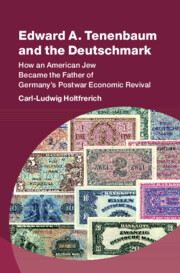 Edward A. Tenenbaum and the Deutschmark
Edward A. Tenenbaum and the Deutschmark Published online by Cambridge University Press: 19 October 2024
Ludwig Erhard was a severely injured WW I veteran. I present data on his vita. Erhard’s education ended with a doctorate at the University of Frankfurt/Main with Franz Oppenheimer, the “liberal socialist,” in 1925. After some unsuccessful years in his father’s textile business at his hometown Fürth, he was employed by the Institute for Economic Observation of German Manufactured Goods in 1929 in Nuremberg. In 1943, Erhard founded his own Institute for Industrial Research. I provide evidence that he had twice shown political turncoat behavior: from a liberal in the European sense during the Weimar Republic to Nazi economic-policy doctrines until German military defeat in 1943 became a foregone conclusion, and thereafter to the American conception of market instead of government-controlled economic conditions. I discuss Erhard’s qualifications for public office as well as the strengths and weaknesses of Erhard’s character.
To save this book to your Kindle, first ensure [email protected] is added to your Approved Personal Document E-mail List under your Personal Document Settings on the Manage Your Content and Devices page of your Amazon account. Then enter the ‘name’ part of your Kindle email address below. Find out more about saving to your Kindle.
Note you can select to save to either the @free.kindle.com or @kindle.com variations. ‘@free.kindle.com’ emails are free but can only be saved to your device when it is connected to wi-fi. ‘@kindle.com’ emails can be delivered even when you are not connected to wi-fi, but note that service fees apply.
Find out more about the Kindle Personal Document Service.
To save content items to your account, please confirm that you agree to abide by our usage policies. If this is the first time you use this feature, you will be asked to authorise Cambridge Core to connect with your account. Find out more about saving content to Dropbox.
To save content items to your account, please confirm that you agree to abide by our usage policies. If this is the first time you use this feature, you will be asked to authorise Cambridge Core to connect with your account. Find out more about saving content to Google Drive.